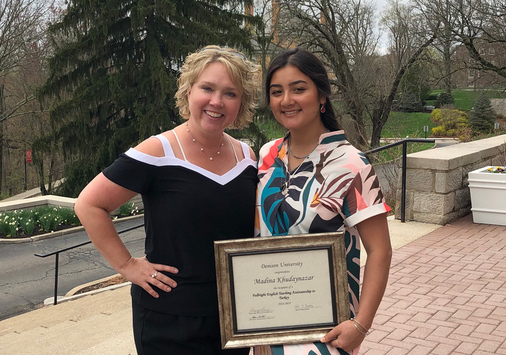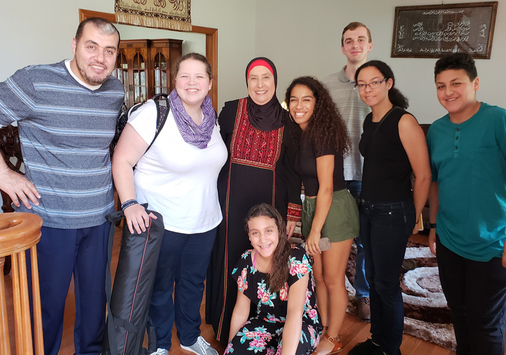Courses
2025 - 2026
For this academic year's course catalog, please visit our Academic Catalog site. For courses currently offered, please refer to the Schedule of Classes.
A survey of the history of the Islamic World from the rise of Islam to the 1800's. Beginning with the revelation of Islam and the emergence of the first Islamic Empire in the seventh century A.D., the course will examine the formation and development of Islamic Societies through a study of religion, political theory and practice, social structure, art, literature and the sciences.
Crosslisting: HIST 121.
This course will cover the major political, cultural, and social features of the modern Middle East, from the eighteenth century to the end of the twentieth century. Among the transformations this course will examine are the rise of colonialism/imperialism and nationalism, as well as other major political and religious ideologies. Covering a geographic area that stretches from North Africa to Iran, this course will highlight case studies emphasizing the diversity of political, social, and economic life across the region.
Crosslisting: HIST 122.
A general category used only in the evaluation of transfer credit.
This course will examine the early modern (16th to 18th century) Ottoman Mediterranean world as one historical landscape with a focus on the issues of identity, conversion, and captivity in the context of sea-based piracy, slavery, and migration. We will ask: What part did loyalty, economic incentives, religious conviction, and coercion play in the decisions that communities, captives, sailors, and commanders made in their pursuit of their interests? By taking a wider view of these historical phenomena and studying them as forms of economic, cultural, and violent exchange, we will have the opportunity to look at the Mediterranean world as a place of both interaction and conflict. This class will have a digital humanities component. As a result, one of the central focuses of this class is using visualizations of historical information as an analytical tool to gain insights about the past and communicating those insights in clear and innovative ways.
A general category used only in the evaluation of transfer credit.
This course will look at the role women have played in the Middle East since the nineteenth century. We will start the course by examining the interpretative methods and sources that historians use to explore this history. Then, after an introduction to the study of women and gender in the Middle East, we turn to several of the major factors that have impacted the role of women in Middle Eastern societies: the Islamic tradition, the colonial period, the rise of nation-states, and various strands of feminism. Our examples will draw from several of the principle countries and regions in and around the Middle East including Iran, Turkey, Egypt, the Levant, and North Africa. As we proceed, students will develop their own research question, bibliography, and ultimately, research paper.
Crosslisting: HIST 321.
Islamic Spain was a place where ancient and new communities encountered and transformed each other. Known in the Middle Ages as al-Andalus, it continues to occupy the cultural and political imaginations of Spain and the Arab world. This class explores al-Andalus through what defines it in scholarly and popular discourse: its religious communities and the cultural contact and synthesis characterizing them. By placing medieval Spain or “Iberia” into its Mediterranean context, the class traces the development of Jewish, Christian, and Muslim communities from their beginnings in the eastern Mediterranean and their settlement in Iberia up to the diasporas in the Mediterranean region today. Rather than essentializing religion, we place it in dialogue with language and culture, tradition and innovation. As a writing-intensive seminar, students will engage the cultural and historical themes of the class through writing in daily discussion posts, in-class reflections, midterm essays, and a phased research project on a theme chosen by the student. The course is closed to first-year students.
Prerequisite(s): SPAN 215 when taught in Spanish, none when taught in English.
Crosslisting: SPAN 324.
Students will engage in an in-depth study of selected topics in the frame of the Atlantic World, which addresses the relations between the cultures of Peninsular Spain and Latin America from a transatlantic perspective. Students will question Western systems of thought, will interrogate structures of power and will develop new connections to the realities of the Hispanic World. Students will summarize, compare and contrast, synthesize and evaluate cultural themes, actors and events. Students will hone their research skills and will demonstrate them through oral presentations, in-depth discussions, creative work, research papers, poster sessions, webspaces, and wikis that meet the ACTFL intermediate-high/advanced-low level standards. Conducted in Spanish.
Prerequisite(s): SPAN 215.
A student in good standing may work intensively in areas of special interest under the Directed Study plan. A Directed Study is appropriate when, under the guidance of a faculty member, a student wants to explore a subject more fully than is possible in a regular course or to study a subject not covered in the regular curriculum. A Directed Study should not normally duplicate a course that is regularly offered. Directed Studies are normally taken for 3 or 4 credits. A one-semester Directed Study is limited to a maximum of 4 credit hours. Note: Directed Studies may not be used to fulfill General Education requirements.
A student in good standing may work intensively in areas of special interest under the Directed Study plan. A Directed Study is appropriate when, under the guidance of a faculty member, a student wants to explore a subject more fully than is possible in a regular course or to study a subject not covered in the regular curriculum. A Directed Study should not normally duplicate a course that is regularly offered. Directed Studies are normally taken for 3 or 4 credits. A one-semester Directed Study is limited to a maximum of 4 credit hours. Note: Directed Studies may not be used to fulfill General Education requirements.
Independent Study engages a student in the pursuit of clearly defined goals. In this effort, a student may employ skills and information developed in previous course experiences or may develop some mastery of new knowledge or skills. A proposal for an Independent Study project must be approved in advance by the faculty member who agrees to serve as the project advisor. Note: Independent Studies may not be used to fulfill General Education requirements.
Independent Study engages a student in the pursuit of clearly defined goals. In this effort, a student may employ skills and information developed in previous course experiences or may develop some mastery of new knowledge or skills. A proposal for an Independent Study project must be approved in advance by the faculty member who agrees to serve as the project advisor. Note: Independent Studies may not be used to fulfill General Education requirements.
A general category used only in the evaluation of transfer credit.
A study of the general features of the economic development experience of the Middle East and North Africa. We will study the structural transformation of these economies and the dynamics of their colonial and post-colonial structures. This course examines the different stages of economic development starting with the early post-colonial period, followed by the period of import substitution industrialization of the 1960s, export-led growth of the 1970s, the debt crisis of the 1980s, the structural adjustment programs of the 1990s, and the Arab uprisings of 2011. We will examine the political economy of the region as it relates to unemployment, poverty, inequality, migration, food insecurity, water stress, climate change, class conflict, gender dynamics, cultural norms, as well as regional and global geopolitical power struggles over the control of key markets such as oil and natural gas.
Prerequisite(s): ECON 301.
Crosslisting: ECON 415.
Students may enroll in Senior Research in their final year at Denison. Normally, Senior Research requires a major thesis, report, or project in the student's field of concentration and carries eight semester-hours of credit for the year. Typically, a final grade for a year-long Senior Research will not be assigned until the completion of the year-long Senior Research at the end of the second semester. Each semester of Senior Research is limited to a maximum of 4 credit hours. Note: Senior Research may not be used to fulfill General Education requirements.
Students may enroll in Senior Research in their final year at Denison. Normally, Senior Research requires a major thesis, report, or project in the student's field of concentration and carries eight semester-hours of credit for the year. Typically, a final grade for a year-long Senior Research will not be assigned until the completion of the year-long Senior Research at the end of the second semester. Each semester of Senior Research is limited to a maximum of 4 credit hours. Note: Senior Research may not be used to fulfill General Education requirements.


